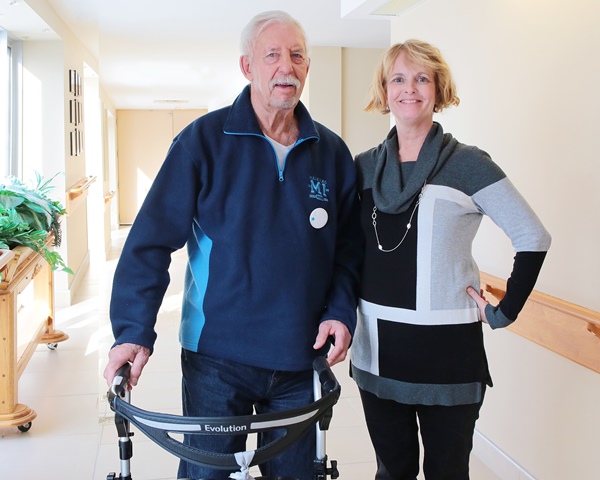By Monica Fleck
Falling is a concern for anyone — especially the elderly. The risk is even greater for people who have some form of dementia, particularly if they are assigned the additional task of learning how to use an assistive walking device. As Canada’s aging population increases, so too does the number of dementia diagnoses, and the meeting of these two trends creates a very real need to help people retain or regain their mobility.
Dr. Susan Hunter of the School of Physical Therapy at Western University has been studying the effects of the use of mobility aids in people with dementia. Her findings have shown that the increased mental demand of using a device makes walking more difficult, and by extension, unsafe. While recognizing that assistive devices improve quality of life by supporting people’s independence, the study set out to discover a way to reduce the falls risk and enhance safety.
“People with dementia have a slower gait speed and an increased cognitive load — or something else demanding their attention — when using an assistive walking device,” says Dr. Hunter.
Learning any new activity, such as how to use a walking aid, requires people to think and process new information more deliberately. People with dementia, who gradually lose their knowledge of how to do things instinctively, are to an extent further compromised by the need to focus more consciously on the walking task. That thought process not only includes the fundamentals of placing their feet, assessing their surroundings and considering their destination, it also includes manoeuvering an assistive device, propelling themselves in union with the device and learning to rely on it.
“The current fall-prevention guidelines and practices that work well in the cognitively healthy older adult have not been as successful in preventing falls in people with dementia,” says Dr. Hunter.
She believes that the answer to this problem lies in developing a new assessment scale that will help reduce the risk of falls and enable people with dementia to safely regain their mobility. The scale will establish a baseline level of physical function and outline a set of nine tasks to determine safety and ability with the mobility aid. Some of these tasks include having the person stand up from a chair and walk, manoeuver around obstacles, and open and close doors behind them, all while using their aid.
In addition to data collected from participant evaluations, the scale was developed using feedback from focus groups comprised of health care professionals, including nurses, geriatricians, physiotherapists, occupational therapists and kinesiologists.
“The expectations and message of all members of the care team need to be united. The scale outlines in a sequential order the actions that make use of the aid safe,” she adds. “It sets out consistent practice standards and allows opportunities to initiate rehabilitation and care practices that are not usually addressed in a systematic way. Gathering input from several areas of health care helps make it a more standardized tool for all care professionals to enhance safety and achieve a successful outcome,” says Dr. Hunter.
The study looked at participants with dementia who are at various stages of walking aid experience, and evaluated variables such as their speed, pace, and stride length. Results showed that the mental demands of using these devices negatively impact balance, gait and steadiness – all factors that, when compromised, increase the risk of falling.
Dr. Hunter is conducting the study at London’s McCormick Dementia Services, Ontario’s largest adult day program, with Dr. Jeff Holmes from the School of Occupational Therapy at Western University; Karen Johnson, Director of McCormick Dementia Services; and Catherine Blake, the Research Coordinator at McCormick Dementia Research.
The assessment scale is nearly complete, and Dr. Hunter expects to release it at no cost to health care professionals later this year as an instructional video with online training materials in English, French and Spanish. “This work will allow care planners to identify areas of concern, to determine if there is a need to start therapy to address ongoing problems with balance or walking, or to specifically address any safety issues.”
Monica Fleck works in communications at McCormick Care Group.


